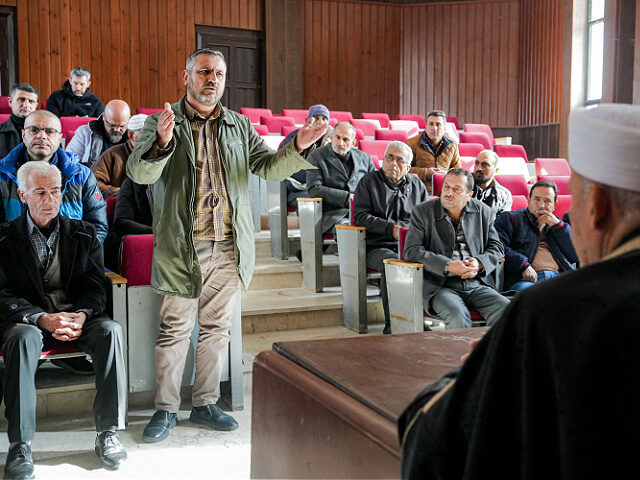Members of Syria’s Alawite community — a small but formerly influential Shiite sect whose members included dictator Bashar Assad — are fearful of persecution at the hands of the Sunni Muslim extremist groups that deposed Assad in a swift attack on Damascus last week.
The Alawites represent about ten percent of Syria’s population, which is mostly Sunni Muslim. The heart of Alawite Syria is the Mediterranean port city of Latakia and its surrounding province.
The Alawites were one of the poorest communities in Syria until one of their own, Hafez al-Assad, seized power in 1971. Assad established a brutal dictatorship which he passed along to his son Bashar upon his death in 2000. Bashar ruled until the Assad dynasty came to a violent end on December 8.
Hafez Assad built his power base by promising power and money to his fellow Alawaites, who came to hold a disproportionate number of high positions in the Syrian government, particularly in the military.
Syrian Alawites became some of the regime’s strongest supporters, although some grumbled that the Assad dynasty never delivered on its promises of prosperity for the community. Now that Assad is gone, some Alawites are telling foreign reporters they were terrorized into obedience, especially during the rise of the Islamic State, when the dictator told Alawites he was the only thing standing between them and torture at the hands of ISIS savages. The younger Assad’s trust in the community had the unfortunate side effect of getting many young Alawite men conscripted into the Syrian army during the long and brutal civil war.
When the jihadi army led by al-Qaeda offshoot Hayat Tahrir al-Sham (HTS) marched on Damascus two weeks ago, one of its top strategic goals was cutting Assad off from the Alawite community in Latakia by conquering the crossroads city of Homs. Many analysts correctly predicted Assad was finished once the road from Damascus to Latakia was blocked.
Alawites are now apprehensive because their communities are cut off, the roads are patrolled by Islamist insurgents, and they are strongly associated with the hated Assad dynasty in the Syrian public mind.
HTS rebels are making a point of destroying everything associated with the vanquished regime. Last week, they desecrated the tomb of Hafez Assad in Qardaha, the town where he was born. Alawite residents watched fearfully as the rebels burned Assad’s casket and posed for photos next to its ruins.
On the other hand, HTS — which is taking pains to present itself as far more “moderate” and “inclusive” than al-Qaeda or ISIS — has met with Alawite community leaders to promise they will not be subject to persecution or retribution.
Some Alawites told the UK Guardian on Sunday they feared the encouraging rhetoric and behavior from HTS would end as soon as the world’s eyes, and cameras, turned away from Syria. They also noted that for all of its many flaws, the Assad government was relatively secular in character, while HTS makes no secret of its plans to impose Islamic sharia law on the country.
“I am scared for my career and my personal beliefs. Will I be able to swim in a bikini now? I doubt it,” a female Alawite lawyer told the Guardian.
“We hope that after everything we’ve been through, they will respect the rights of people. We hope that by dealing with us, they will get a more accurate picture of who we are,” another nervous Alawite said.
The BBC on Monday noted that other Islamist groups that were part of the victorious rebel coalition have taken control of Alawite towns around Latakia, and some of them are less interested in being “inclusive” than HTS. Alawites have complained of being beaten and robbed by members of these other militias.
Another problem facing the Alawites is that many of them belonged to a shadowy paramilitary force known as the Shabiha, which had roots in Hafez Assad’s rise to power in the early 1970s. The Shabiha did a good deal of the dirtiest work for both Assad dictators, and Alawites fear they could be victimized by other Syrians looking for payback.
Some Alawites told the BBC they were afraid to leave their homes, while others fled their homes as quickly as possible, fearful of death squads that might start checking lists of addresses for suspected Shabiha members or other regime loyalists.
Alawites are also lamenting that members of the sect suffered as much as everyone else under the half-century of Assad family misrule. Sky News reported on Monday that Alawites are quick to show off their impoverished living conditions and quick to say they celebrate the ouster of Bashar Assad as much as anyone else — but apparently few other groups of Syrians are willing to believe the Alawites did not receive special privileges under the Assads.
“We just want to live in security because everyone is definitely scared now — nobody is not scared now — but for sure we should all unite to work to overcome the problems and work together, we are all one,” an Alawite villager told Sky News.

COMMENTS
Please let us know if you're having issues with commenting.